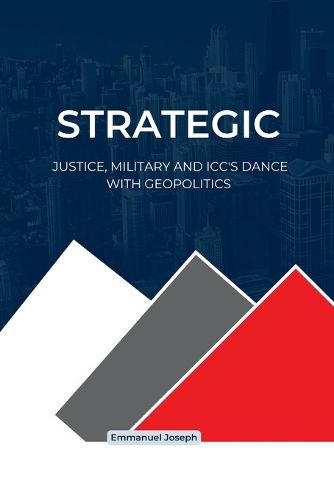Readings Newsletter
Become a Readings Member to make your shopping experience even easier.
Sign in or sign up for free!
You’re not far away from qualifying for FREE standard shipping within Australia
You’ve qualified for FREE standard shipping within Australia
The cart is loading…






Strategic Justice: Military and ICC's Dance with Geopolitics
In "Strategic Justice: Military and ICC's Dance with Geopolitics," dive into the intricate and often tumultuous relationship between the military, international justice, and the geopolitical landscape. This book unravels the complex dynamics that shape the International Criminal Court's (ICC) quest for accountability while navigating the power plays of global politics.
The journey begins with the genesis of the ICC, a beacon of hope for addressing the world's gravest crimes. Through its establishment, the book explores the court's mission, challenges, and the critical role it plays in holding individuals accountable for genocide, war crimes, and crimes against humanity. As the narrative unfolds, readers gain insights into the delicate balance the ICC must strike between justice and state sovereignty.
The book delves into the military's profound influence on global governance, highlighting how military interventions, both as perpetrators and protectors, intersect with the realm of international justice. It examines the thorny issues of military prosecutions, command responsibility, and the often fraught cooperation between military forces and the ICC.
Geopolitical interests take center stage as the book reveals how powerful states shape the ICC's agenda. It scrutinizes the selective nature of prosecutions, the court's dependence on member states for enforcement, and the intricate dance between the ICC and the United Nations Security Council. These dynamics underscore the constant interplay between justice and global power.
As the narrative progresses, readers are taken through the ICC's impact on domestic legal systems, the vital role of civil society, and the lessons learned from the court's past experiences. The book offers a thoughtful reflection on the future of the ICC in an ever-changing geopolitical landscape, emphasizing the need for adaptability, cooperation, and a commitment to inclusivity and fairness.
"Strategic Justice: Military and ICC's Dance with Geopolitics" is an enlightening exploration of the ICC's efforts to promote accountability and justice. It challenges readers to consider the complex realities of international justice and the enduring quest for a just and equitable world.
$9.00 standard shipping within Australia
FREE standard shipping within Australia for orders over $100.00
Express & International shipping calculated at checkout
Strategic Justice: Military and ICC's Dance with Geopolitics
In "Strategic Justice: Military and ICC's Dance with Geopolitics," dive into the intricate and often tumultuous relationship between the military, international justice, and the geopolitical landscape. This book unravels the complex dynamics that shape the International Criminal Court's (ICC) quest for accountability while navigating the power plays of global politics.
The journey begins with the genesis of the ICC, a beacon of hope for addressing the world's gravest crimes. Through its establishment, the book explores the court's mission, challenges, and the critical role it plays in holding individuals accountable for genocide, war crimes, and crimes against humanity. As the narrative unfolds, readers gain insights into the delicate balance the ICC must strike between justice and state sovereignty.
The book delves into the military's profound influence on global governance, highlighting how military interventions, both as perpetrators and protectors, intersect with the realm of international justice. It examines the thorny issues of military prosecutions, command responsibility, and the often fraught cooperation between military forces and the ICC.
Geopolitical interests take center stage as the book reveals how powerful states shape the ICC's agenda. It scrutinizes the selective nature of prosecutions, the court's dependence on member states for enforcement, and the intricate dance between the ICC and the United Nations Security Council. These dynamics underscore the constant interplay between justice and global power.
As the narrative progresses, readers are taken through the ICC's impact on domestic legal systems, the vital role of civil society, and the lessons learned from the court's past experiences. The book offers a thoughtful reflection on the future of the ICC in an ever-changing geopolitical landscape, emphasizing the need for adaptability, cooperation, and a commitment to inclusivity and fairness.
"Strategic Justice: Military and ICC's Dance with Geopolitics" is an enlightening exploration of the ICC's efforts to promote accountability and justice. It challenges readers to consider the complex realities of international justice and the enduring quest for a just and equitable world.